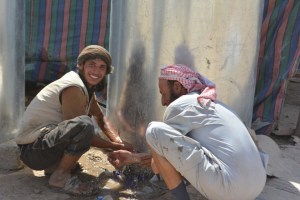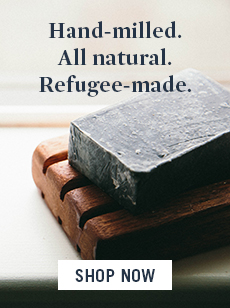Imagine walking eight exhausting days in the Iraqi sun and dust and then being met with food, water, and a shady place to rest. This refreshment is exactly what you provided to families fleeing military action in Iraq. Though Mosul is free from ISIS control, other areas in the western part of the country face continued fighting against ISIS, and families are desperate to reach safety.
You reached them just a few miles from the front lines, setting up tents and creating a rest area just past a security checkpoint. You provided snacks, water, and juice. You gave shoes to those who were barefoot and hats to block the sun. Toilets and showers were available. Doctors and staff from our local health clinic offered medical checkups.

Over 825 families passed through in five days, about 5,451 people altogether. Families stayed for a few hours and then moved on, ready for the next stage of their journey to find shelter.
For those of you who give monthly, your regular support allows us to meet these critical needs as soon as they arise, without having to raise funds first—and that made all the difference to these displaced families.
As people in Iraq recover from conflict, you are walking beside them. Here are more ways you showed up in recent weeks…

Water for Three Communities in Iraq
Fighting in Mosul destroyed the underground pipes that carry water to houses, so there is no running water for thousands of families. Your love has repaired damaged pipes in several neighborhoods, but many are still waiting.
 For four months now, you have delivered fresh water on tanker trucks to neighborhoods without tap water in west Mosul. The drivers go from house to house, filling individual tanks with 10 liters of water per person per day. These deliveries mean that families do not have to lug water from a central tank or worse, go without clean water.
For four months now, you have delivered fresh water on tanker trucks to neighborhoods without tap water in west Mosul. The drivers go from house to house, filling individual tanks with 10 liters of water per person per day. These deliveries mean that families do not have to lug water from a central tank or worse, go without clean water.
In recent weeks, you helped us deliver over 6 million liters of clean water! Families and medical clinics will continue getting these regular distributions until city water is fully restored.
But that is just the beginning. We recently learned of one neighborhood that hadn’t been receiving water regularly because ISIS sleeper cells are making it too dangerous for daily deliveries.
These 450 families had very little water to cook, clean, or wash with. When you heard this, you responded within days and gave the funds to dig a new well to serve the whole area.
The neighborhood came out to watch the drilling process, and the well has been dug.

It is already being used to meet the hygiene needs of this community—allowing mothers to bathe their children and families to clean their homes. The well has reduced the amount of water we need to transport into the community by nearly 80%, allowing our trucks and staff to serve other communities in need.
In another part of Iraq, you are providing water to families living in a mountaintop displacement camp. It’s not a sanctioned refugee camp established by an NGO agency. It’s a rough collection of tents, abandoned houses, and half-built utility buildings topped with nylon tarps. It grew organically as families arrived from various places. Here, Arab Sunnis, Yazidis, and Assyrian Christians live together and have formed a caring community.
But fresh water is a big need.
No municipal water is available here, and it’s impossible to drill a well into the mountainside. So you are providing water trucks that go to each home.

Last month, we delivered 468,000 liters of water to the 47 families here. Women no longer have to carry heavy water containers from a central tank, and everyone has enough to drink.
Nine Medical Clinics
Last month, our newest medical clinic in Mosul opened with big fanfare. The neighborhood enjoyed a ribbon-cutting ceremony, balloons and decorations, and cake for all. Your love provides part of the salary for the 18 staff who serve this clinic and provides work and income for two families who run the cafeteria.
But this regional health center offers much more than primary medical care. It is a community center where local teenagers can connect and volunteer. It offers sewing and literacy classes for women who have gone through a trauma therapy course. It has a technology room where staff can take continuing education courses. And it has the capacity to host specialists in cardiology and nephrology in the future.
 All in one clinic.
All in one clinic.
This newest clinic is part of a network of 9 medical centers you’ve been supporting around Iraq for ten months now. Together these clinics have provided over 100,000 medical consultations in the last two months alone.
Your generosity provides vaccines and pays the salaries of dozens of doctors, nurses, and staff, including Dr. Mustafa, above, and Dr. Ameer, below, with his signature baseball hat.

A Chance to Go to School
As schools reopened in the U.S., your generosity made sure Iraqi children were not forgotten. You recently took part in two school projects in Iraq to help children receive an education.
The first was the successful completion of the first-ever school for Yazidi children in northwestern Iraq. The Yazidis are one of the most persecuted minorities in Iraq; three years ago, they were targeted for extermination by ISIS.
In the winter of 2016, Yazidi village leaders there explained that they had never had their own school and asked for help building one so displaced families would want to move back home.
 The groundbreaking took place last November, and work finished in the spring. Now desks and supplies are in place, and this beautiful school in the mountains is holding classes. This building is a tangible sign of hope for the struggling community.
The groundbreaking took place last November, and work finished in the spring. Now desks and supplies are in place, and this beautiful school in the mountains is holding classes. This building is a tangible sign of hope for the struggling community.
Christian families in Telsquf, north of Mosul, had a different problem. Their school was badly damaged in the fight against ISIS. While there was another school 20 minutes up the road, there weren’t enough buses to take everyone.
Again, local leaders asked for help, and you responded by purchasing two new school buses. Now children on the outskirts of Mosul are returning to the classroom instead of losing another year of education.

Thank you for seeing the need for water, medicine, and education in Iraq—and responding with generosity and love. You are showing Iraqi people that they are not forgotten.


